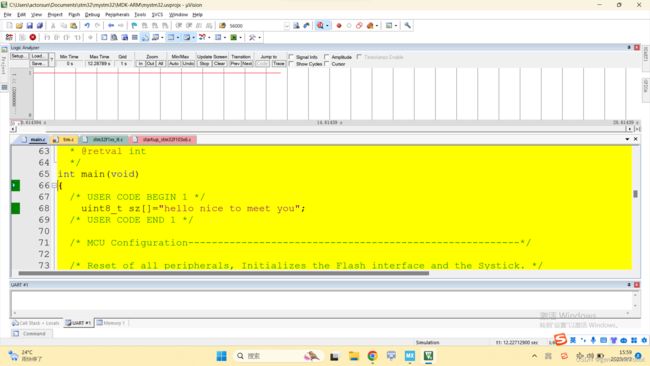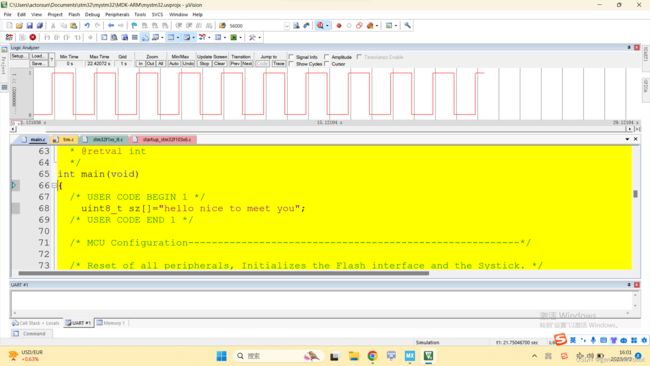- STM32中的计时与延时
lupinjia
STM32stm32单片机
前言在裸机开发中,延时作为一种规定循环周期的方式经常被使用,其中尤以HAL库官方提供的HAL_Delay为甚。刚入门的小白可能会觉得既然有官方提供的延时函数,而且精度也还挺好,为什么不用呢?实际上HAL_Delay中有不少坑,而这些也只是HAL库中无数坑的其中一些。想从坑里跳出来还是得加强外设原理的学习和理解,切不可只依赖HAL库。除了延时之外,我们在开发中有时也会想要确定某段程序的耗时,这就需要
- 基于STM32与Qt的自动平衡机器人:从控制到人机交互的的详细设计流程
极客小张
stm32qt机器人物联网人机交互毕业设计c语言
一、项目概述目标和用途本项目旨在开发一款基于STM32控制的自动平衡机器人,结合步进电机和陀螺仪传感器,实现对平衡机器人的精确控制。该机器人可以用于教育、科研、娱乐等多个领域,帮助用户了解自动控制、机器人运动学等相关知识。技术栈关键词STM32单片机步进电机陀螺仪传感器AD采集电路Qt人机界面实时数据监控二、系统架构系统架构设计本项目的系统架构设计包括以下主要组件:控制单元:STM32单片机传感器
- 基于STM32的汽车仪表显示系统:集成CAN、UART与I2C总线设计流程
极客小张
stm32汽车嵌入式硬件物联网单片机c语言
一、项目概述项目目标与用途本项目旨在设计和实现一个基于STM32微控制器的汽车仪表显示系统。该系统能够实时显示汽车的速度、转速、油量等关键信息,并通过CAN总线与其他汽车控制单元进行通信。这种仪表显示系统不仅提高了驾驶的安全性和便捷性,还能为汽车提供更智能的用户体验。技术栈关键词微控制器:STM32显示技术:TFTLCD/OLED传感器:速度传感器、温度传感器、油量传感器通信协议:CAN总线、UA
- 51单片机——I2C总线存储器24C02的应用
老侯(Old monkey)
51单片机嵌入式硬件单片机
目标实现功能单片机先向24C02写入256个字节的数据,再从24C02中一次读取2个字节的数据、并在数码管上动态显示,直至读完24C02中256个字节的数据。1.I2C总线简介I2C总线有两根双向的信号线,一根是数据线SDA,另一根是时钟线SCL。I2C总线通过上拉电阻接正电源,因此,当总线空闲时为高电平。2.I2C通信协议起始信号、停止信号由主机发出。在数据传送时,当时钟线为高电平时,数据线上的
- 嵌入式单片机中数码管基本实现方法
嵌入式开发星球
单片机项目实战操作之优秀单片机
1.点亮数码管本节课利用已经学习的LED知识去控制一个8位数码管。本节的原理比较简单。不需要多少时间讲。更多时间是跟大家一起编码调试,从中学习一些编码思路和学习方法。1.1.什么是数码管数码管是什么?下图就是一个数码管从硬件上个看,其实就是8个LED组合在一起。8个LED应该有16个引脚,但是数码管上只有10个引脚。为什么呢?请看下图:1个LED有两个引脚,要控制LED,1个引脚接控制信号,另外一
- 基于STM32的简易RTOS分析-预备知识
騏威
嵌入式
写下这篇文章的主要目的是对自己学习RTOS的历程做一个记录和总结,方便以后回忆翻看。以下内容主要来自宋岩先生翻译的《Cortex-M3权威指南》。目录一、Cortex-M3寄存器简介二、堆栈操作简介三、汇编指令简介LDR和STR指令STMDB和LDMIA指令B、BX、BL、BLX指令MRS和MSR指令四、中断简介中断响应过程简介SVC和PensSV中断简介软件中断五、汇编基础一、Cortex-M3
- 15-自编写rtos-结合stm32实际调试(ladylolo-os)
Ladylolo-lsm
stm32嵌入式硬件单片机
一、任务调度:1.理解:任务切换,用堆栈指针SP保存即将要切换的任务的前后文,然后是用PendSV来执行这些操作的;由于是基于优先级的调度策略,所以每次“心跳”都会看有没有优先级更高的出现,如果有就用PendSV进行上下文切换。2.编写部分:①每个任务自己的属性统称为TCB任务控制块。②任务就绪表有设置优先级(设置的时候变量或上优先级的变量让某个位数等于1),从任务就绪表中删除(删除时用与来得等于
- 小米嵌入式面试题目RTOS面试题目 嵌入式面试题目
好家伙VCC
面试杂谈杂谈面试职场和发展
第一章-非RTOSbootloader工作流程MCU启动流程通信协议,SPIIICMCU怎么选型,STM32F1和F4有什么区别外部RAM和内部RAM区别,怎么分配外部总线和内部总线区别MCU上的固件,数据是怎么分配的MCU启动流程IAP是怎么升级的,突然断电怎么办挑了麦轮项目(因为大疆RM也是麦轮,面试官看样子比较感兴趣)为什么用的CAN总线你说一下spi和i2c和UART的各自的工作方式优缺点
- 基于STM32F103C8T6定时器的PWM通道的重映射
—你的鼬先生
stm32嵌入式硬件单片机
在我们平时的的使用中,我们最常使用的是TIM2和TIM3的PWM通道,但是由于C8T6的IO口有限,所以可能会出现PWM通道的资源不够的情况,从而我们可能会使用PWM4的PWM通道,但是TIM4的PWM通道并不能直接使用,它需要进行一个重映射,不然可能会导致PWM波不能正常发送。以下就是对PWM4的PWM通道进行一个重映射#include"stm32f10x.h"//Deviceheadervoi
- 【STM32系统】基于STM32设计的锂电池电量/电压检测报警器系统——文末完整资料下载(程序源码/电路原理图/电路PCB/设计文档/模块资料/元器件清单/实物图/答辩问题技巧/PPT模版等)
阿齐Archie
单片机嵌入式项目stm32嵌入式硬件单片机
基于STM32设计的锂电池电量/电压检测报警器系统系统视频:摘要:本设计旨在研究一个基于STM32F103C8T6微控制器的锂电池电量/电压检测报警器系统,应用于便携式电子设备电池管理。系统通过STM32的ADC模块对锂电池电压进行采集,利用LCD1602显示模块实时显示电池电压,当检测到电池电量不足或电压异常时,蜂鸣器报警模块会发出警报提醒用户。系统采用简单的硬件结构和优化的软件架构,通过对实际
- 使用STM32实现简单的智能温控系统
棂梓知识
stm32单片机嵌入式硬件
智能温控系统是一种能够根据环境温度实时调整设备的工作状态的系统。在本篇文章中,我们将使用STM32微控制器来实现一个简单的智能温控系统。该系统将会有以下功能:实时监测环境温度,并显示在LCD屏幕上。当环境温度超过设定的阈值时,自动开启风扇。当环境温度恢复正常时,自动关闭风扇。通过按键模拟调节设定的阈值。系统设计首先,我们需要准备一些硬件设备。具体而言,我们需要以下组件:STM32F103C8T6开
- STM32 HAL freertos零基础(九)任务通知
啥也不会的小白研究生
零基础学习Freertosstm32嵌入式硬件单片机
1、任务通知任务通知用于任务之间同步和通信。任务通知允许一个任务向另一个任务发送一个32位的值,并可以选择是否唤醒正在等待通知的任务。这使得任务之间的同步更加简单和灵活。任务通知功能:发送通知:一个任务可以向另一个任务发送一个32位的值。接收通知:接收任务可以根据接收到的通知来决定何时执行某些操作。通知状态:可以检查任务的当前通知状态。2、相关APIxTaskNotify()//发送通知,带有通知
- 4×4矩阵键盘详解(STM32)
辰哥单片机设计
STM32传感器教学矩阵计算机外设stm32嵌入式硬件单片机传感器
目录一、介绍二、传感器原理1.原理图2.工作原理介绍三、程序设计main.c文件button4_4.h文件button4_4.c文件四、实验效果五、资料获取项目分享一、介绍矩阵键盘,又称为行列式键盘,是用4条I/O线作为行线,4条I/O线作为列线组成的键盘。在行线和列线的每一个交叉点上设置一个按键,因此键盘中按键的个数是4×4个。这种行列式键盘结构能够有效地提高单片机系统中I/O口的利用率,节约单
- STM32的寄存器深度解析
千千道
STM32stm32单片机物联网
目录一、STM32寄存器概述二、寄存器的定义与作用三、寄存器分类1.内核寄存器2.外设寄存器四、重要寄存器详解1.GPIO相关寄存器2.定时器相关寄存器3.中断相关寄存器4.RCC相关寄存器五、寄存器操作方法1.直接操作寄存器2.使用库函数操作寄存器六、总结在嵌入式系统开发中,STM32微控制器以其强大的性能和丰富的功能而备受青睐。而理解和掌握STM32的寄存器是深入学习和开发STM32的关键。本
- STM32 如何生成随机数
千千道
STM32stm32单片机物联网
目录一、引言二、STM32随机数发生器概述三、工作原理1.噪声源2.线性反馈移位寄存器(LFSR)3.数据寄存器(RNG_DR)4.监控和检测电路:5.控制和状态寄存器6.生成流程四、使用方法1.使能随机数发生器2.读取随机数3.错误处理五、注意事项1.随机数的质量2.安全性3.性能考虑六、总结一、引言在嵌入式系统开发中,随机数的生成常常是一个重要的需求。无论是用于加密、模拟、游戏还是其他需要不确
- STM32——看门狗通俗解析
百里与司空
stm32嵌入式硬件单片机门控循环单元
笔者在学习看门狗的视频后,对看门狗仍然是一知半解,后面在实际应用中发现它是一个很好用的检测或者调试工具。所以总结一下笔者作为初学小白对看门狗的理解。主函数初始化阶段、循环阶段和复位众所周知,程序的运行一般是这样的:程序在进入循环阶段之前,会在初始化阶段将每个寄存器或者某些变量赋值。初始化阶段的代码执行一次后,就不再执行了。而循环阶段的代码会执行很多次,一直循环反复的执行下去。这时,如果进行了复位,
- STM32 的 RTC(实时时钟)详解
千千道
STM32stm32物联网单片机
目录一、引言二、RTC概述三、RTC的工作原理1.时钟源2.计数器3.闹钟功能4.备份寄存器四、RTC寄存器1.RTC_TR(TimeRegister,时间寄存器)2.RTC_DR(DateRegister,日期寄存器)3.RTC_SSR(SubsecondRegister,亚秒寄存器)4.RTC_PRER(PrescalerRegister,预分频器寄存器)5.RTC_CR(ControlReg
- 学单片机怎么在3-5个月内找到工作?
无际单片机编程
单片机嵌入式开发物联网stm32c语言
每个初学者,都如履薄冰,10几年前,我自学单片机时,也一样。想通过学习,找一份体面点的工作,又害怕辛辛苦苦学出来,找不到工作。好在,当初执行力,还算可以,自学java没成功,后面自学单片机,成功入行了。转眼间,毕业到现在有13年了,马上也到了奔4的年纪。这13年一直在跟单片机打交道,打过工,创过业,对行业,对企业,都有一定的认知,坚持看完这篇内容,相信能帮你少走几个月弯路。有些老铁,加了我很久,时
- 51单片机:P3.3口输入/P 1口输出实验
li星野
单片机
51单片机:P3.3口输入/P1口输出实验一、实验内容1P3.3口做输入口,外接一脉冲,每输入一个脉冲,P1口按十六进制除2(乘2)。2.P1口做输出口,P1口接的8个发光二极管L1—L8按十六进制除2(乘2)方式点亮。二、仿真图三、代码实现C语言实现:#include#includesbitKEY=P3^3;voiddelay10ms(void);voidmain(){charnum=0xfe;
- 2020-11-12 写单片机内存的脚本 nc openocd 事务自动测试
linuxScripter
这是写单片机内存的脚本:z@z-ThinkPad-T400:~/zworkT400/EDA_heiche/zREPOgit/simple-gcc-stm32-project$catz.wholeRun.oneCase.cmdcattmp6.toWrite|awk'{system("echomwb"$1""$2"|nclocalhost4444");}'catUSER/DEBUG/debug.h|g
- 单片机中断
woainizhongguo.
STM32单片机原理解析篇单片机嵌入式硬件
**在51单片机中,中断向量表的地址是如何被设置的?**在51单片机中,中断向量表的设置是中断系统的核心部分,它定义了中断服务程序的入口地址。以下是中断向量表的设置方法:中断向量表的位置:51单片机的中断向量表通常位于程序存储器的起始位置,即地址0x0000到0x000F(对于双字节的中断向量,实际占用0x0000到0x001F)。这些地址是固定的,由单片机的硬件设计决定。中断向量的分配:每个中断
- arm-none-eabi-gcc 不识别__attribute__((at(xxx))命令如何将数据定义到外部SDAM(已验证)
梓默
#C
提示:文章写完后,目录可以自动生成,如何生成可参考右边的帮助文档文章目录可以利用__attribute__((section(".xxx")))实现同样的效果步骤:1.在linker链接文件中添加指定SDRAM加偏移地址2.添加SDRAM自定义section3.将数据定义到自定义区可以利用__attribute__((section(".xxx")))实现同样的效果步骤:从STM32H7xx参考手
- 基于STC12C5A60S2单片机的LED汉字显示系统的设计
lantiandianzi
单片机嵌入式硬件
本设计基于单片机的LED汉字显示装置,该设计以STC12C5A60S2单片机为核心,利用最小系统和多个模块完成设计,包括点阵驱动模块、时钟模块、串口通信模块、红外线接收模块以及LED点阵屏。其中,点阵驱动模块采用74HC245芯片设计完成,结合DS1302时钟芯片完成LED点阵显示屏的汉字与时间显示,使用按键、串口、红外线遥控可以完成时间的实时更新、自定义汉字显示、改变汉字显示颜色、改变汉字滚动方
- 51单片机-AT24C02-实验2-秒表实验(可参考上一节)
Whappy001
51单片机嵌入式硬件单片机
利用定时器去对按键和数码管进行扫描(Whappy)main.c#include#include"LCD1602.h"#include"AT24C02.h"#include"Delay.h"#include"Timer0.h"#include"Nixie.h"#include"Key.h"unsignedcharKeyNum;unsignedcharMin,Sec,MiniSec;unsignedc
- 单片机在医疗设备中的应用实例教程
kkchenjj
单片机单片机嵌入式硬件
单片机在医疗设备中的应用实例教程单片机基础单片机概述单片机,全称为单片微型计算机(Single-ChipMicrocomputer),是一种将中央处理器(CPU)、存储器、输入输出接口等主要计算机部件集成在一块芯片上的微型计算机系统。它具有体积小、功耗低、成本低廉、控制功能强大等特点,广泛应用于工业控制、家用电器、汽车电子、医疗设备等多个领域。特点集成度高:单片机将计算机的主要部件集成在一块芯片上
- 单片机与传感器接口技术应用实例教程
kkchenjj
单片机单片机nosql嵌入式硬件
单片机与传感器接口技术应用实例教程单片机基础单片机概述单片机,全称为单片微型计算机(Single-ChipMicrocomputer),是一种将中央处理器(CPU)、存储器、输入输出接口等主要计算机部件集成在一块芯片上的微型计算机系统。它具有体积小、功耗低、成本低廉、控制功能强大等特点,广泛应用于工业控制、家用电器、汽车电子、通信设备、医疗器械等领域。特点集成度高:单片机将计算机的主要部件集成在一
- Error: No STM32 target found! If your product embeds Debug Authentication, please perform a discover
BABA8891
stm32嵌入式硬件单片机
这个错误信息“Error:NoSTM32targetfound!IfyourproductembedsDebugAuthentication,pleaseperformadiscoveryusingDebugAuthentication”通常出现在使用STM32微控制器的开发过程中,尤其是在尝试通过调试接口(如SWD或JTAG)与设备通信时。这个错误表明调试器或开发工具无法识别或连接到STM32目
- 【OpenHarmony嵌入式硬件开发】基于OpenHarmony标准系统的C++公共基础类库案例2:SafeMap
青少年编程作品集
嵌入式硬件c++javasqlharmonyos华为华为云
1、程序简介该程序是基于OpenHarmony的C++公共基础类库的安全关联容器:SafeMap。OpenHarmony提供了一个线程安全的map实现。SafeMap在STLmap基础上封装互斥锁,以确保对map的操作安全。本案例主要完成如下工作:创建1个子线程,负责每秒调用EnsureInsert()插入元素;创建1个子线程,负责每秒调用Insert()插入元素;创建1个子线程,负责每秒调用Er
- 掌握单片机,其实并不难
培林将军
单片机嵌入式硬件
Fearwillbeyourenemy恐惧将会是你的敌人单片机的学习绝不仅仅是对一项知识的掌握。想要学好单片机,需要从硬件结构、内部资源、外设应用等几个方面多方位入手。而要想成为一名嵌入式工程师,就要对单片机的基础非常熟悉,并且掌握C语言当中各个功能的初始化、启动、停止各类函数的编写调试。那么想要掌握单片机需要从哪几个方面入手呢?数字I/O的应用在大多数的单片机实验中,跑马灯实验正是数字I/O的典
- STM32与ESP8266的使用
每天的积累
嵌入式学习日记stm32stm32单片机嵌入式硬件
串口透传“透传”通常指的是数据的透明传输,意思是在不对数据进行任何处理或修改的情况下,将数据从一个接口转发到另一个接口。值得注意的是要避免串口之间无限制的透明,可以采用互斥锁的方式进行限制使用方法对USART1和USART3(用他俩举例)的模式都是设置为Asynchronous,并开启对应的中断。RCC的HighSPeedCLock模式设置为Crystal/Ceramic配置对应的时钟为64Mhz
- 对股票分析时要注意哪些主要因素?
会飞的奇葩猪
股票 分析 云掌股吧
众所周知,对散户投资者来说,股票技术分析是应战股市的核心武器,想学好股票的技术分析一定要知道哪些是重点学习的,其实非常简单,我们只要记住三个要素:成交量、价格趋势、振荡指标。
一、成交量
大盘的成交量状态。成交量大说明市场的获利机会较多,成交量小说明市场的获利机会较少。当沪市的成交量超过150亿时是强市市场状态,运用技术找综合买点较准;
- 【Scala十八】视图界定与上下文界定
bit1129
scala
Context Bound,上下文界定,是Scala为隐式参数引入的一种语法糖,使得隐式转换的编码更加简洁。
隐式参数
首先引入一个泛型函数max,用于取a和b的最大值
def max[T](a: T, b: T) = {
if (a > b) a else b
}
因为T是未知类型,只有运行时才会代入真正的类型,因此调用a >
- C语言的分支——Object-C程序设计阅读有感
darkblue086
applec框架cocoa
自从1972年贝尔实验室Dennis Ritchie开发了C语言,C语言已经有了很多版本和实现,从Borland到microsoft还是GNU、Apple都提供了不同时代的多种选择,我们知道C语言是基于Thompson开发的B语言的,Object-C是以SmallTalk-80为基础的。和C++不同的是,Object C并不是C的超集,因为有很多特性与C是不同的。
Object-C程序设计这本书
- 去除浏览器对表单值的记忆
周凡杨
html记忆autocompleteform浏览
&n
- java的树形通讯录
g21121
java
最近用到企业通讯录,虽然以前也开发过,但是用的是jsf,拼成的树形,及其笨重和难维护。后来就想到直接生成json格式字符串,页面上也好展现。
// 首先取出每个部门的联系人
for (int i = 0; i < depList.size(); i++) {
List<Contacts> list = getContactList(depList.get(i
- Nginx安装部署
510888780
nginxlinux
Nginx ("engine x") 是一个高性能的 HTTP 和 反向代理 服务器,也是一个 IMAP/POP3/SMTP 代理服务器。 Nginx 是由 Igor Sysoev 为俄罗斯访问量第二的 Rambler.ru 站点开发的,第一个公开版本0.1.0发布于2004年10月4日。其将源代码以类BSD许可证的形式发布,因它的稳定性、丰富的功能集、示例配置文件和低系统资源
- java servelet异步处理请求
墙头上一根草
java异步返回servlet
servlet3.0以后支持异步处理请求,具体是使用AsyncContext ,包装httpservletRequest以及httpservletResponse具有异步的功能,
final AsyncContext ac = request.startAsync(request, response);
ac.s
- 我的spring学习笔记8-Spring中Bean的实例化
aijuans
Spring 3
在Spring中要实例化一个Bean有几种方法:
1、最常用的(普通方法)
<bean id="myBean" class="www.6e6.org.MyBean" />
使用这样方法,按Spring就会使用Bean的默认构造方法,也就是把没有参数的构造方法来建立Bean实例。
(有构造方法的下个文细说)
2、还
- 为Mysql创建最优的索引
annan211
mysql索引
索引对于良好的性能非常关键,尤其是当数据规模越来越大的时候,索引的对性能的影响越发重要。
索引经常会被误解甚至忽略,而且经常被糟糕的设计。
索引优化应该是对查询性能优化最有效的手段了,索引能够轻易将查询性能提高几个数量级,最优的索引会比
较好的索引性能要好2个数量级。
1 索引的类型
(1) B-Tree
不出意外,这里提到的索引都是指 B-
- 日期函数
百合不是茶
oraclesql日期函数查询
ORACLE日期时间函数大全
TO_DATE格式(以时间:2007-11-02 13:45:25为例)
Year:
yy two digits 两位年 显示值:07
yyy three digits 三位年 显示值:007
- 线程优先级
bijian1013
javathread多线程java多线程
多线程运行时需要定义线程运行的先后顺序。
线程优先级是用数字表示,数字越大线程优先级越高,取值在1到10,默认优先级为5。
实例:
package com.bijian.study;
/**
* 因为在代码段当中把线程B的优先级设置高于线程A,所以运行结果先执行线程B的run()方法后再执行线程A的run()方法
* 但在实际中,JAVA的优先级不准,强烈不建议用此方法来控制执
- 适配器模式和代理模式的区别
bijian1013
java设计模式
一.简介 适配器模式:适配器模式(英语:adapter pattern)有时候也称包装样式或者包装。将一个类的接口转接成用户所期待的。一个适配使得因接口不兼容而不能在一起工作的类工作在一起,做法是将类别自己的接口包裹在一个已存在的类中。 &nbs
- 【持久化框架MyBatis3三】MyBatis3 SQL映射配置文件
bit1129
Mybatis3
SQL映射配置文件一方面类似于Hibernate的映射配置文件,通过定义实体与关系表的列之间的对应关系。另一方面使用<select>,<insert>,<delete>,<update>元素定义增删改查的SQL语句,
这些元素包含三方面内容
1. 要执行的SQL语句
2. SQL语句的入参,比如查询条件
3. SQL语句的返回结果
- oracle大数据表复制备份个人经验
bitcarter
oracle大表备份大表数据复制
前提:
数据库仓库A(就拿oracle11g为例)中有两个用户user1和user2,现在有user1中有表ldm_table1,且表ldm_table1有数据5千万以上,ldm_table1中的数据是从其他库B(数据源)中抽取过来的,前期业务理解不够或者需求有变,数据有变动需要重新从B中抽取数据到A库表ldm_table1中。
- HTTP加速器varnish安装小记
ronin47
http varnish 加速
上午共享的那个varnish安装手册,个人看了下,有点不知所云,好吧~看来还是先安装玩玩!
苦逼公司服务器没法连外网,不能用什么wget或yum命令直接下载安装,每每看到别人博客贴出的在线安装代码时,总有一股羡慕嫉妒“恨”冒了出来。。。好吧,既然没法上外网,那只能麻烦点通过下载源码来编译安装了!
Varnish 3.0.4下载地址: http://repo.varnish-cache.org/
- java-73-输入一个字符串,输出该字符串中对称的子字符串的最大长度
bylijinnan
java
public class LongestSymmtricalLength {
/*
* Q75题目:输入一个字符串,输出该字符串中对称的子字符串的最大长度。
* 比如输入字符串“google”,由于该字符串里最长的对称子字符串是“goog”,因此输出4。
*/
public static void main(String[] args) {
Str
- 学习编程的一点感想
Cb123456
编程感想Gis
写点感想,总结一些,也顺便激励一些自己.现在就是复习阶段,也做做项目.
本专业是GIS专业,当初觉得本专业太水,靠这个会活不下去的,所以就报了培训班。学习的时候,进入状态很慢,而且当初进去的时候,已经上到Java高级阶段了,所以.....,呵呵,之后有点感觉了,不过,还是不好好写代码,还眼高手低的,有
- [能源与安全]美国与中国
comsci
能源
现在有一个局面:地球上的石油只剩下N桶,这些油只够让中国和美国这两个国家中的一个顺利过渡到宇宙时代,但是如果这两个国家为争夺这些石油而发生战争,其结果是两个国家都无法平稳过渡到宇宙时代。。。。而且在战争中,剩下的石油也会被快速消耗在战争中,结果是两败俱伤。。。
在这个大
- SEMI-JOIN执行计划突然变成HASH JOIN了 的原因分析
cwqcwqmax9
oracle
甲说:
A B两个表总数据量都很大,在百万以上。
idx1 idx2字段表示是索引字段
A B 两表上都有
col1字段表示普通字段
select xxx from A
where A.idx1 between mmm and nnn
and exists (select 1 from B where B.idx2 =
- SpringMVC-ajax返回值乱码解决方案
dashuaifu
AjaxspringMVCresponse中文乱码
SpringMVC-ajax返回值乱码解决方案
一:(自己总结,测试过可行)
ajax返回如果含有中文汉字,则使用:(如下例:)
@RequestMapping(value="/xxx.do") public @ResponseBody void getPunishReasonB
- Linux系统中查看日志的常用命令
dcj3sjt126com
OS
因为在日常的工作中,出问题的时候查看日志是每个管理员的习惯,作为初学者,为了以后的需要,我今天将下面这些查看命令共享给各位
cat
tail -f
日 志 文 件 说 明
/var/log/message 系统启动后的信息和错误日志,是Red Hat Linux中最常用的日志之一
/var/log/secure 与安全相关的日志信息
/var/log/maillog 与邮件相关的日志信
- [应用结构]应用
dcj3sjt126com
PHPyii2
应用主体
应用主体是管理 Yii 应用系统整体结构和生命周期的对象。 每个Yii应用系统只能包含一个应用主体,应用主体在 入口脚本中创建并能通过表达式 \Yii::$app 全局范围内访问。
补充: 当我们说"一个应用",它可能是一个应用主体对象,也可能是一个应用系统,是根据上下文来决定[译:中文为避免歧义,Application翻译为应
- assertThat用法
eksliang
JUnitassertThat
junit4.0 assertThat用法
一般匹配符1、assertThat( testedNumber, allOf( greaterThan(8), lessThan(16) ) );
注释: allOf匹配符表明如果接下来的所有条件必须都成立测试才通过,相当于“与”(&&)
2、assertThat( testedNumber, anyOf( g
- android点滴2
gundumw100
应用服务器android网络应用OSHTC
如何让Drawable绕着中心旋转?
Animation a = new RotateAnimation(0.0f, 360.0f,
Animation.RELATIVE_TO_SELF, 0.5f, Animation.RELATIVE_TO_SELF,0.5f);
a.setRepeatCount(-1);
a.setDuration(1000);
如何控制Andro
- 超简洁的CSS下拉菜单
ini
htmlWeb工作html5css
效果体验:http://hovertree.com/texiao/css/3.htmHTML文件:
<!DOCTYPE html>
<html xmlns="http://www.w3.org/1999/xhtml">
<head>
<title>简洁的HTML+CSS下拉菜单-HoverTree</title>
- kafka consumer防止数据丢失
kane_xie
kafkaoffset commit
kafka最初是被LinkedIn设计用来处理log的分布式消息系统,因此它的着眼点不在数据的安全性(log偶尔丢几条无所谓),换句话说kafka并不能完全保证数据不丢失。
尽管kafka官网声称能够保证at-least-once,但如果consumer进程数小于partition_num,这个结论不一定成立。
考虑这样一个case,partiton_num=2
- @Repository、@Service、@Controller 和 @Component
mhtbbx
DAOspringbeanprototype
@Repository、@Service、@Controller 和 @Component 将类标识为Bean
Spring 自 2.0 版本开始,陆续引入了一些注解用于简化 Spring 的开发。@Repository注解便属于最先引入的一批,它用于将数据访问层 (DAO 层 ) 的类标识为 Spring Bean。具体只需将该注解标注在 DAO类上即可。同时,为了让 Spring 能够扫描类
- java 多线程高并发读写控制 误区
qifeifei
java thread
先看一下下面的错误代码,对写加了synchronized控制,保证了写的安全,但是问题在哪里呢?
public class testTh7 {
private String data;
public String read(){
System.out.println(Thread.currentThread().getName() + "read data "
- mongodb replica set(副本集)设置步骤
tcrct
javamongodb
网上已经有一大堆的设置步骤的了,根据我遇到的问题,整理一下,如下:
首先先去下载一个mongodb最新版,目前最新版应该是2.6
cd /usr/local/bin
wget http://fastdl.mongodb.org/linux/mongodb-linux-x86_64-2.6.0.tgz
tar -zxvf mongodb-linux-x86_64-2.6.0.t
- rust学习笔记
wudixiaotie
学习笔记
1.rust里绑定变量是let,默认绑定了的变量是不可更改的,所以如果想让变量可变就要加上mut。
let x = 1; let mut y = 2;
2.match 相当于erlang中的case,但是case的每一项后都是分号,但是rust的match却是逗号。
3.match 的每一项最后都要加逗号,但是最后一项不加也不会报错,所有结尾加逗号的用法都是类似。
4.每个语句结尾都要加分

